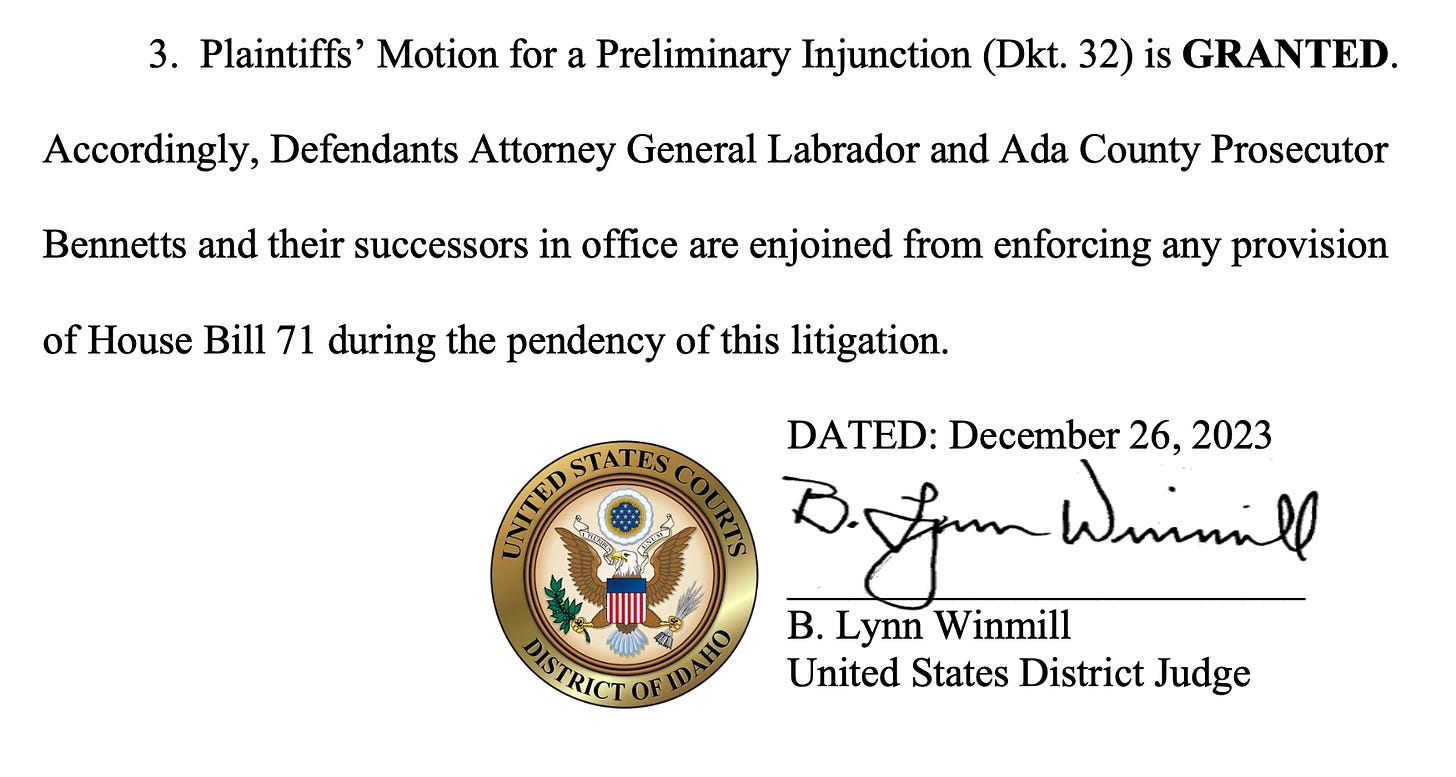Federal judge blocks Idaho gender-affirming care ban days before it was to go into effect
Ruling responds to appeals courts that upheld state bans. Their reasoning "renders the Fourteenth Amendment largely meaningless," U.S. District Judge B. Lynn Winmill wrote.
A federal judge in Idaho on Tuesday blocked the state’s felony ban on gender-affirming medical care for minors, finding that it is likely unconstitutional.
The decision added to the more than 10 federal court rulings on similar bans this year. The rapid pace of court decisions follows the unprecedented wave of anti-transgender laws passed largely in Republican-led states in 2023.
“[T]he Fourteenth Amendment’s primary role is to protect disfavored minorities and preserve our fundamental rights from legislative overreach,” U.S. District Judge B. Lynn Winmill wrote. “That was true for newly freed slaves following the civil war. It was true in the 20th Century for women, people of color, inter-racial couples, and individuals seeking access to contraception. And it is no less true for transgender children and their parents in the 21st Century.”
The Idaho law, passed earlier this year as H.B. 71 and signed into law by Republican Gov. Brad Little, was set to go into effect on Jan. 1. The law would have punished those medical providers who violate it with a felony, subject to up to 10 years in prison.
With Winmill’s preliminary injunction ruling, though, the law will be unenforceable while litigation continues.
Two federal appeals courts in other parts of the country have upheld similar bans as likely constitutional. Those rulings were notable for how they conflicted with an earlier appeals court ruling and the rulings of district court judges across the political spectrum. Before the appeals court rulings in August and September, every federal district judge to consider the question had ruled such laws to be likely unconstitutional (or unconstitutional, depending on the procedural posture of the case). Only one federal district court judge, in Oklahoma, has ruled initially against the challengers to such a ban — and that judge did so after and relying heavily upon the two appeals court rulings.
After Tuesday, the Oklahoma district court judge will remain the trial court outlier.
The ruling from Winmill, a Clinton appointee, also comes as three requests are at the U.S. Supreme Court asking the justices to take up at least one case over the constitutionality of these bans — including one from the Biden administration. Due to extensions granted on when the states will be responding to the requests, the court is not expected to hear arguments in the case until the next term, which would begin in October 2024, if the justices even agree to hear one of more of the cases.
Read the Law Dork Q&A with the ACLU’s Chase Strangio over the decision to ask the Supreme Court to hear gender-affirming care ban cases. (Nov. 3, 2023).
In the meantime though, Winmill has weighed in, addressing Idaho’s attempt at restricting health care for transgender minors.
In opening his 53-page opinion “explain[ing] why Idaho’s Vulnerable Child Protection Act violates the Fourteenth Amendment,” Winmill first addressed “criticism common” to court rulings striking down laws as violating the 14th Amendment.
“Critics say such decisions are anti-democratic and frustrate the will of the people as expressed by their elected legislature. And they are right,” Winmill wrote. “But that is precisely how our constitutional democracy is supposed to work. The authors of the Fourteenth Amendment fully understood and intended that the amendment would prevent state legislatures from passing laws that denied equal protection of the laws or invaded the fundamental rights of the people.”
It was a clear statement striking at the heart of Judge Jeff Sutton’s opinion for the U.S. Court of Appeals for the Sixth Circuit upholding similar bans in Kentucky and Tennessee — the second of the two appeals court rulings siding with the states’ defense of the bans.
In finding that the challengers have a “strong likelihood of success” in their challenge, Winmill sided with the challengers on both their equal protection claim — that the law unconstitutionally discriminates on the basis of sex and transgender status —and their due process claim — parental rights to “seek and follow medical advice to protect the health and wellbeing of their minor children.”
In discussing the evidence presented in support of both sides’ arguments, Winmill found that the World Professional Association for Transgender Health (“WPATH”) and Endocrine Society’s guidelines set forth treatment plans for trans minors that are “safe, effective, and medically necessary for some adolescents.”
After finding that plaintiffs met various initial requirements to bring their challenge and ruled against Republican Attorney General Raúl Labrador and a county prosecutor’s motions to be dismissed from the lawsuit, Winmill addressed the key legal questions about the equl protection and due process claims.
“HB 71 explicitly classifies on the basis of transgender status. Granted, the word ‘transgender’ doesn’t appear in the statute. But if you consider the definition of a transgender person—again, someone whose gender identity doesn’t match their birth sex—a quick skim of HB 71 reveals that the legislature classified on that basis.” Winmill found, adding that, additionally, “HB 71 discriminates by proxy, as only transgender people seek treatment for gender dysphoria.”
Winmill also found that the law discriminates on the basis of sex because transgender discrimination is a type of sex-based discrimination under the relevant caselaw, it “classifies on the basis of gender nonconformity,” and “it draws sex-based classifications on its face.”
Winmill specifically responded to the claims that have increasingly found a home in states’ briefs — including in this case — and in a handful of rulings about the applicability of the Supreme Court’s decision in Dobbs v. Jackson Women’s Health Organization and an underlying case from the 1970s cited in Dobbs, Geduldig v. Aiello, to challenges to anti-trans laws.
In Dobbs, Geduldig was cited in the court’s one-paragraph dismissal of the argument that abortion bans discriminate based on sex. Geduldig, in turn, addressed a California disability insurance program that excluded pregnancy-related coverage. The court in that decision — before its modern sex discrimination jurisprudence was established — held that such a decision was permissible because men and women both received the same benefits from the program and the state provided “an objective and wholly noninvidious basis for the State's decision not to” cover pregnancy-related disability claims.
Supporters of the gender-affirming care bans argue that the same reasoning applies to them. To that, though, Winmill found that H.B. 71 is different.
Notably, in addition to lawyers from Labrador’s office, the attorney general has retained lawyers from the conservative D.C. law firm of Cooper & Kirk to represent Idaho in the case — with the office’s lawyers being designated as “special deputy attorneys general,” as agreed to in the contract obtained by Law Dork in response to a public records request and seen in filings in the case. In the contract, Cooper & Kirk highlighted that it is defending such bans in several cases across the country on behalf of multiple clients.
Read the exclusive Law Dork report on Idaho Attorney General Raúl Labrador’s practice of contracting with lawyers from Alliance Defending Freedom to defend some of the state’s most conservative policies (Dec. 21, 2023).
Applying his findings to the question of whether the law, accordingly, passes intermediate scrutiny, Winmill acknowledged that “safeguarding the wellbeing” of minors is clearly important, but then ruled that the state’s rationale “is pretextual, given that HB 71 allows the same treatments for cisgender minors that are deemed unsafe and thus banned for transgender minors.”
Ultimately, then, Winmill found the law likely unconstitutional on equal protection grounds.
He went on to similarly rule that the parents challenging the law were likely to succeed in their parental rights due process claim.
Under past Supreme Court precedent, the most important decision in ruling on such a “liberty” claim is often deciding what the claim is. The Supreme Court has held that the claim must be made at a sufficient level of specificity. In other words, a person can’t overly generalize the right so that it would encompass everything.
Here, Winmill found that “the appropriately precise way to frame the issue is to ask whether parents’ fundamental right to care for their children includes the right to choose a particular medical treatment, in consultation with their healthcare provider, that is generally available and accepted in the medical community.” At that level, Winmill wrote that “the Court has no difficulty concluding that such a right is deeply rooted in our nation’s history and traditions and implicit in our concept of ordered liberty.”
Addressing the appeals courts’ rulings against the parental right claims to the contrary, Winmill wrote, “The Sixth and Eleventh Circuit’s framing of the fundamental right renders the Fourteenth Amendment largely meaningless.” Specifically, he continued, “If the right is narrowly defined as the right to seek a specific medical treatment, the entirety of modern medicine would fall outside of the scope of a parent’s right to control their children’s health care.”
After resolving the other factors in issuing a preliminary injunction in the challengers’ favor and finding that a statewide injunction is appropriate here, Winmill barred Labrador and the Ada County prosecutor from enforcing the law.
An appeal from this ruling would be heard in the U.S. Court of Appeals for the Ninth Circuit, which is generally one of the more progressive appeals courts but — as has been seen in other cases — does have a handful of judges, primarily Trump appointees, willing to do anything they can to push back.
Talking SCOTUS with Molly Jong-Fast
If you want to listen to some Law Dork, I joined Molly Jong-Fast on her Fast Politics podcast on Monday to talk about the Supreme Court and what we should be expecting from it in the coming months for her Fast Politics podcast on Monday. Here’s our episode (and here it is on Spotify), but you should be able to find it wherever you listen to podcasts!








Past time I supported this fine work, Chris. Happy New Year and thank you for making me smarter (starting from zero makes it easier already but seriously, good work & good writing steepens the brain-curve).
"[T]he office’s lawyers being designated as “special deputy attorneys general,” as agreed to in the contract obtained by Law Dork in response to a public records request."
Look at you doing some legwork. Awesome job!